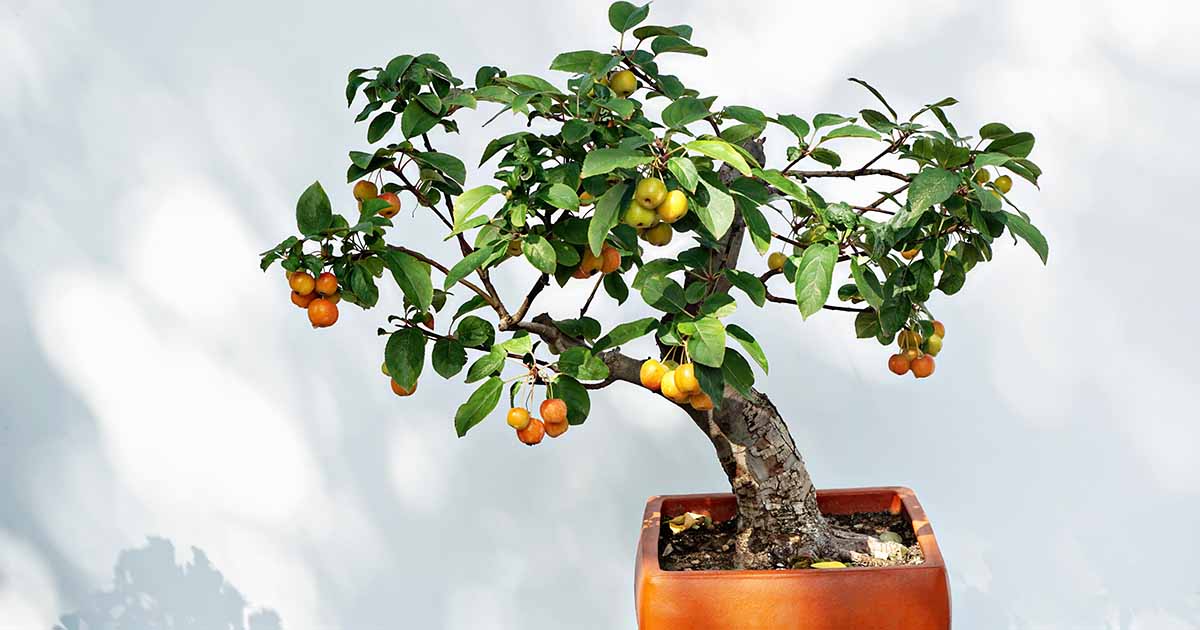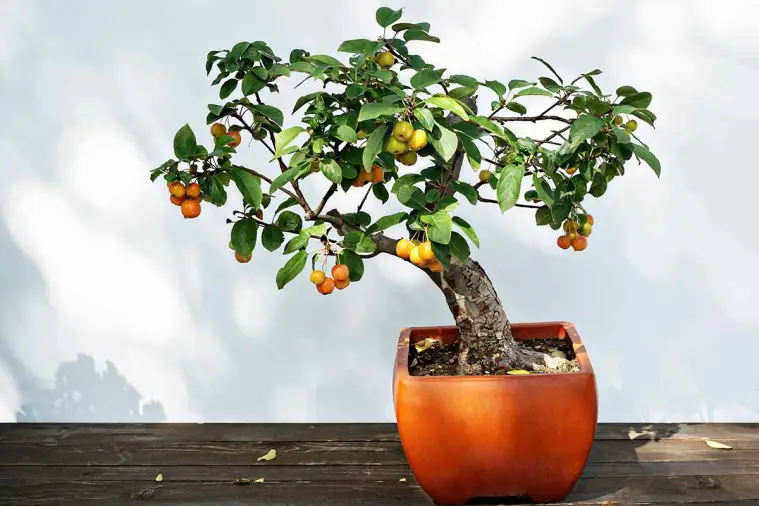A bonsai fruit tree will produce regular-sized fruits despite its small stature. It does not produce miniature fruits.
Bonsai fruit trees are fascinating miniature versions of full-sized trees. Despite their small size, they yield full-sized fruits, making them unique and attractive. These tiny trees are perfect for gardeners with limited space. Bonsai fruit trees add beauty and functionality to any indoor or outdoor setting.
Will a Bonsai Fruit Tree Make Small Fruits: They require proper care, including pruning, watering, and sunlight, to thrive and produce fruit. Enthusiasts enjoy the challenge and reward of growing these miniature marvels. With patience and dedication, you can cultivate a thriving bonsai fruit tree that will bear delicious, full-sized fruits year after year.
Table of Contents
The Charm Of Bonsai Fruit Trees
Bonsai fruit trees are small and elegant. They bring a touch of nature indoors. Their small size makes them perfect for small spaces. The tiny fruits they produce are both cute and real. These trees require special care to stay healthy and beautiful.
Growing a bonsai fruit tree is a rewarding hobby. It takes time and patience. But the result is worth it. The miniature beauty of these trees is unmatched. They add a unique charm to any room.
There are many types of bonsai fruit trees. Some popular ones include apple, cherry, and fig. Each variety has its own unique look. Apple bonsai trees have beautiful blossoms. Cherry bonsai trees produce lovely pink flowers. Fig bonsai trees are known for their sweet fruits.
These trees are not just for show. They can produce real, edible fruits. The fruits are smaller than normal, but they taste just as good. Caring for these trees can be a fun and educational activity. They teach patience and attention to detail.
Bonsai Fruit Trees: Myth Vs. Reality
Bonsai trees are small, but their fruits are not always tiny. Many people believe bonsai fruit trees produce small fruits. This is a common myth. The tree’s size does not dictate the fruit size. The fruit size depends on the tree species. A bonsai apple tree can produce regular-sized apples. Only the tree is miniature, not the fruits. This surprises many beginners in bonsai growing.
Bonsai trees need proper care for healthy growth. Regular pruning keeps the tree small. Adequate sunlight and watering are essential. Fertilizers help in fruit development. A well-cared bonsai tree can live for many years. Healthy bonsai trees produce healthy fruits. The tree’s health impacts the fruit’s quality. Proper care ensures good fruit production. The tree’s size does not limit its fruiting capability.
Will a Bonsai Fruit Tree Make Small Fruits: The Science Behind Bonsai Fruiting
Bonsai trees have the same genetic makeup as their full-sized counterparts. Genetics determine the type and size of the fruit. Even a small bonsai tree can produce full-sized fruits. The size of the tree does not change the genetic coding of the fruit.
Pruning helps to maintain the small size of a bonsai tree. Pruning does not affect the size of the fruit. Proper pruning ensures the tree remains healthy. Healthy trees produce better quality fruits.

Credit: gardenerspath.com
Cultivating A Bonsai Fruit Tree
Choose a species that is known for small fruits. Citrus trees like lemons and oranges are good. Apple and cherry trees can also be used. Consider the climate where you live. Some trees need more sun and warmth. Tropical species might not do well in cold places. Ask a local nursery for advice.
Water the tree regularly but do not overwater. Use a well-draining soil mix. Prune the branches to keep the shape small. Fertilize the tree during the growing season. Protect the tree from pests and diseases. Repot the tree every 2-3 years. Ensure the pot has drainage holes. Monitor the sunlight the tree receives.
Fruit Production On A Bonsai
Bonsai trees can produce flowers just like regular trees. Flowers need to be pollinated to make fruit. Bees and other insects help with pollination. Hand pollination can also be done using a small brush. Successful pollination will lead to fruit formation on the bonsai.
Fruits on a bonsai start to form after pollination. They grow slowly due to the small size of the tree. Water and nutrients are crucial for the fruit to set and ripen. Sunlight helps the fruit to mature and become sweet. Patience is key as bonsai fruits take time to ripen fully.
Credit: www.quora.com
Size Matters: Expectations Vs. Reality
Bonsai trees are small but their fruits can be normal-sized. Many people think bonsai fruits are tiny. This is a common misunderstanding. Bonsai trees keep their natural fruit size. So, you can get normal-sized apples or oranges. Fruit size depends on tree type, not the bonsai method.
Tree species is the main factor in fruit size. Some trees naturally have small fruits. Care and environment also play a big role. Good soil, water, and sunlight make healthy fruits. Bonsai pruning affects tree size but not fruit size. Proper care ensures the tree makes normal fruits.
Practical Tips For Bonsai Fruit Trees
Use balanced fertilizer for bonsai fruit trees. A fertilizer with equal parts nitrogen, phosphorus, and potassium works best. Apply fertilizer every two weeks during the growing season. Stop fertilizing in late fall and winter. Over-fertilizing can harm the tree, so follow the package instructions carefully.
Water bonsai fruit trees regularly but avoid overwatering. The soil should be moist but not soggy. Check the soil daily, especially in hot weather. Place the tree in a location with plenty of sunlight. Six hours of direct sunlight each day is ideal. Rotate the tree occasionally to ensure even growth.

Credit: www.quora.com
The Aesthetic And Symbolic Significance
Bonsai fruit trees produce small fruits, adding both aesthetic charm and symbolic value to your space. These miniature marvels embody patience and artistry.
Cultural Importance
Bonsai trees hold a deep cultural importance. They symbolize patience and careful nurturing. The art of bonsai began in China and spread to Japan. Each tree represents a miniature landscape. People believe bonsai trees bring good luck and harmony. They are often given as gifts for special occasions. Bonsai trees also teach the importance of balance in life. Their small size allows them to fit in any space. This makes them popular in urban areas. Many families cherish bonsai trees for generations.
Aesthetic Appeal
Bonsai trees are beautiful and unique. They add a touch of nature to any room. The small, delicate leaves create a sense of peace. Their tiny fruit looks like jewels on the branches. Each tree is a work of art. The twisted trunks and branches tell a story of time and growth. Bonsai trees can be shaped in many styles. This allows for endless creativity. Their small size makes them easy to move and display. A bonsai tree is a living sculpture that changes with the seasons.
Frequently Asked Questions
Why Are My Fruit Trees Producing Small Fruit?
Small fruit may result from inadequate watering, poor soil nutrition, overcrowded branches, or lack of pollination. Ensure proper care.
Can Bonsai Fruit Be Eaten?
Yes, bonsai fruit can be eaten. They are regular fruits, just grown on miniature trees. Ensure they are not treated with harmful chemicals before consumption.
Can I Keep My Fruit Trees Small?
Yes, you can keep fruit trees small. Regular pruning, selecting dwarf varieties, and proper spacing help manage their size.
Will Oranges Grow On A Small Bonsai Tree?
Yes, oranges can grow on a small bonsai tree. Dwarf citrus varieties are suitable for bonsai cultivation. Ensure proper care and conditions.
Conclusion
Yes, a bonsai fruit tree will produce small fruits. The size is due to the tree’s limited space and nutrients. Bonsai fruit trees make charming, unique additions to any garden. They are perfect for those wanting fresh fruit in compact spaces.
Enjoy the beauty and benefits of a bonsai fruit tree today.
